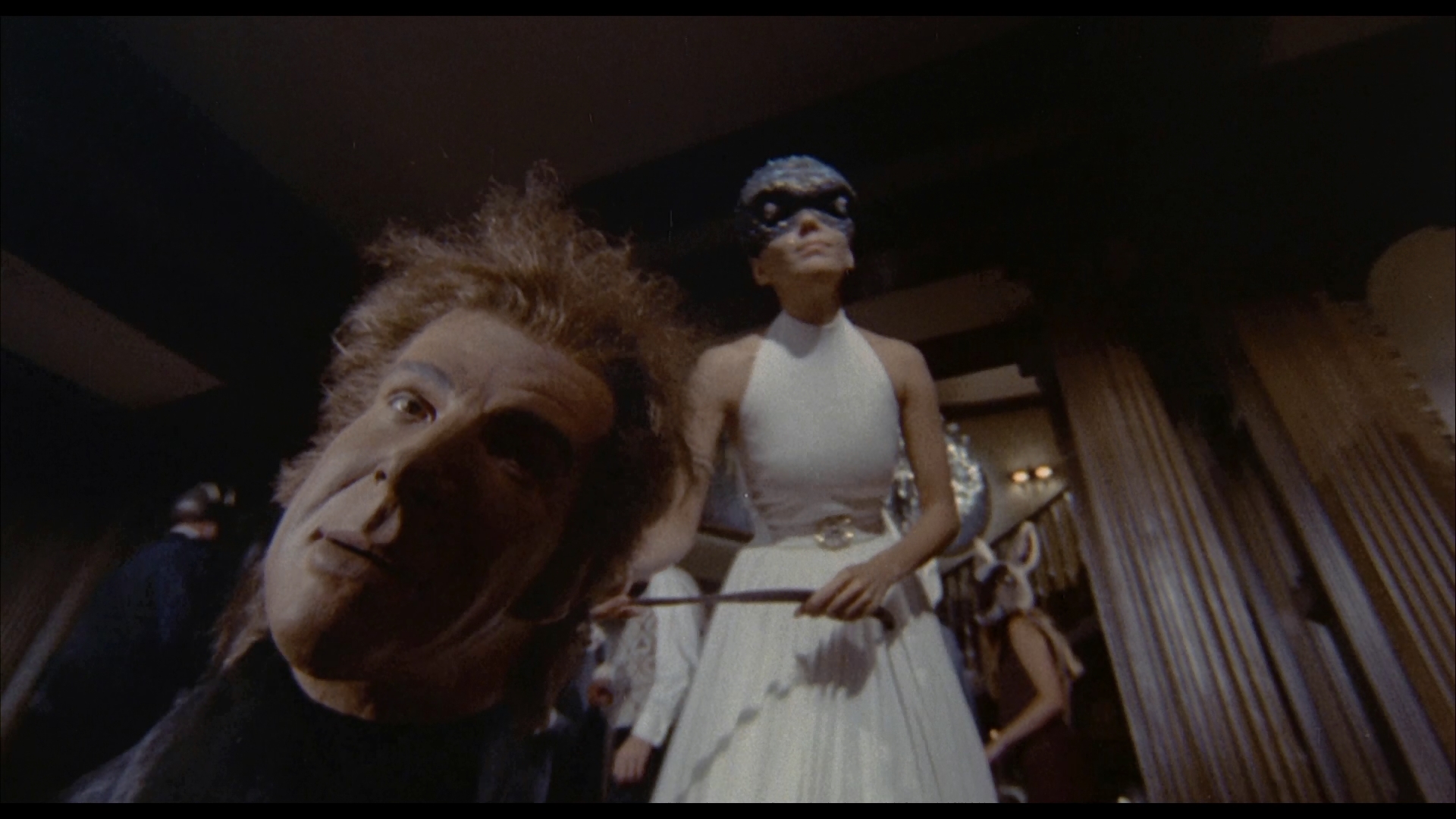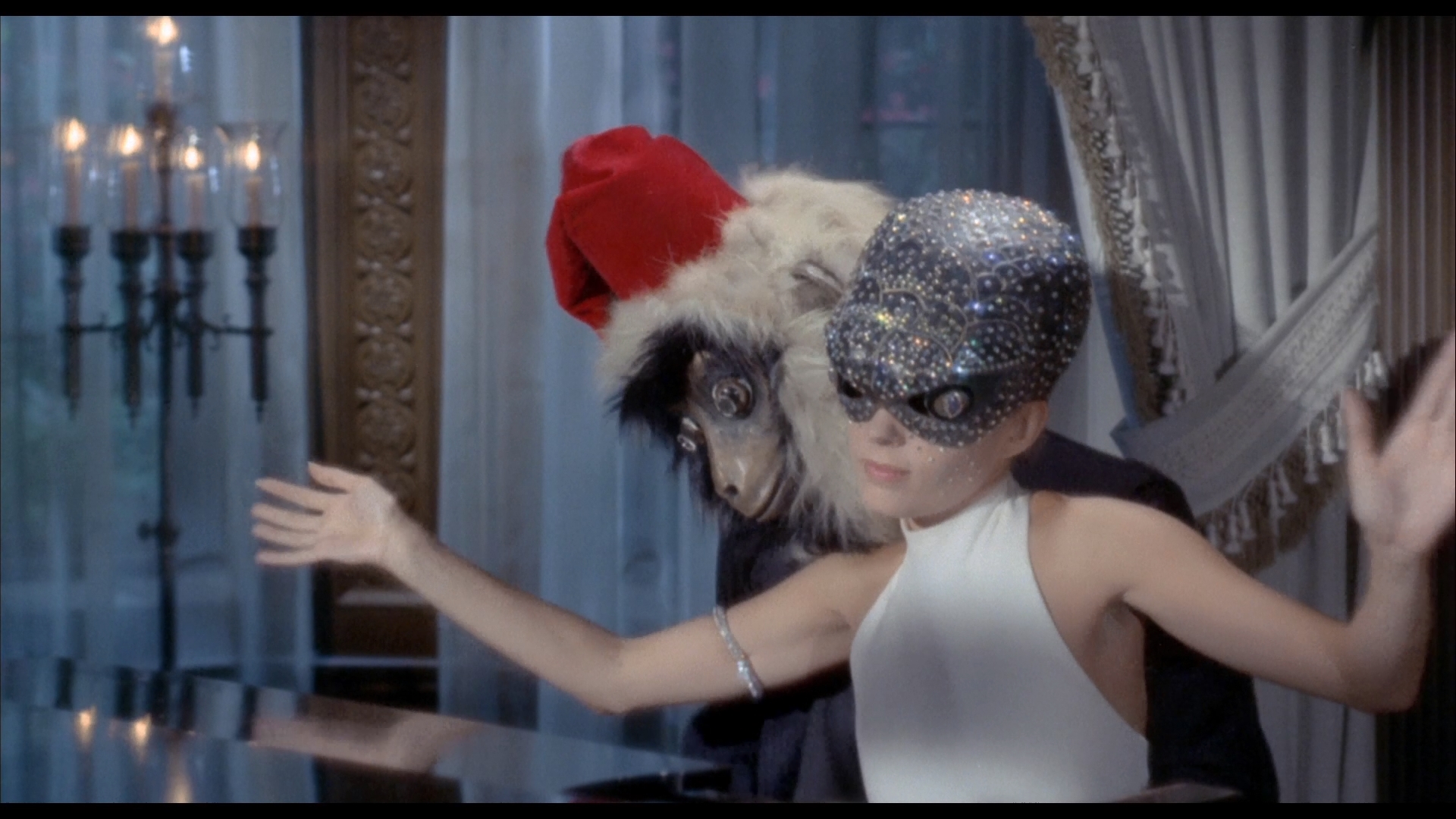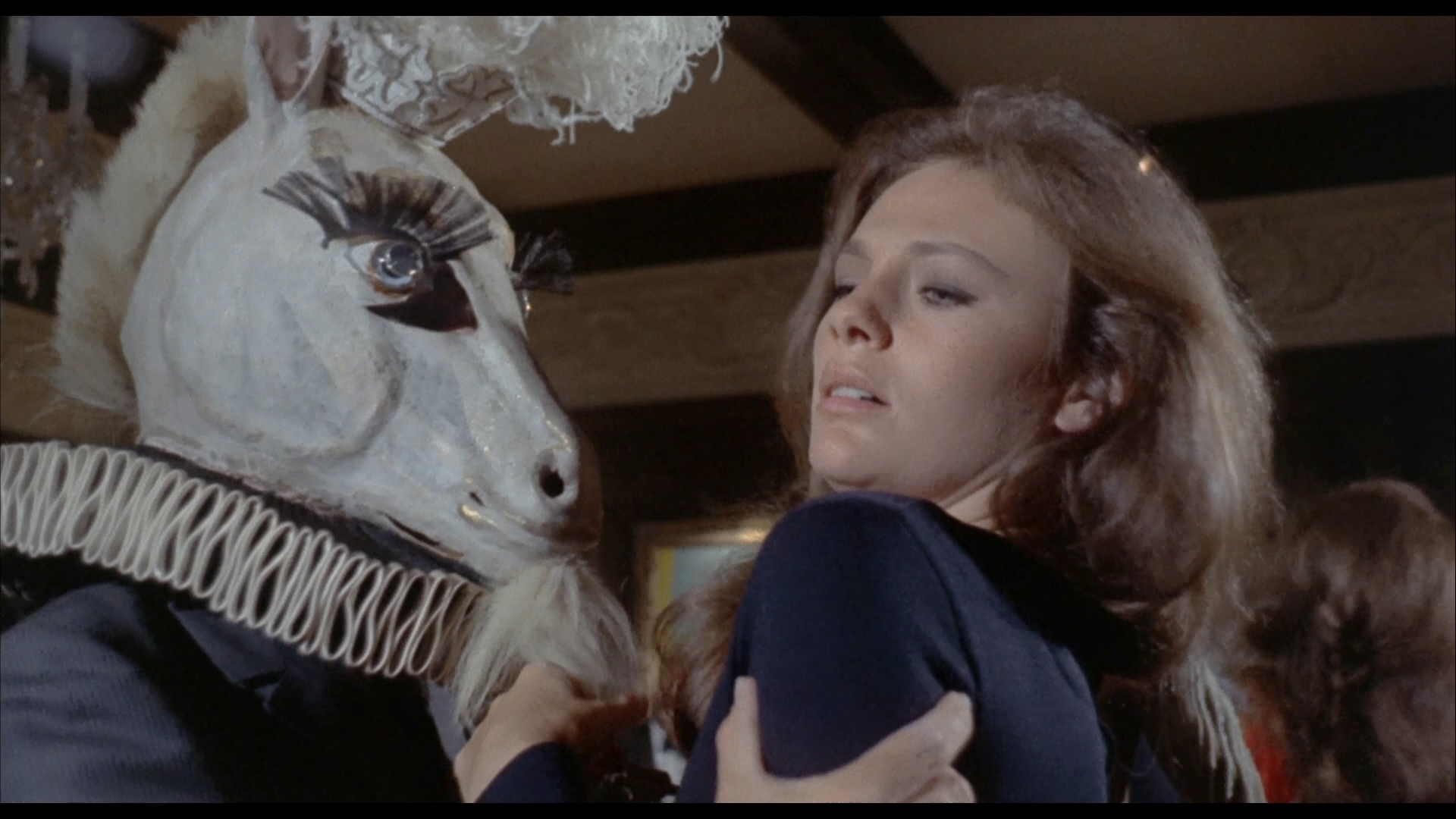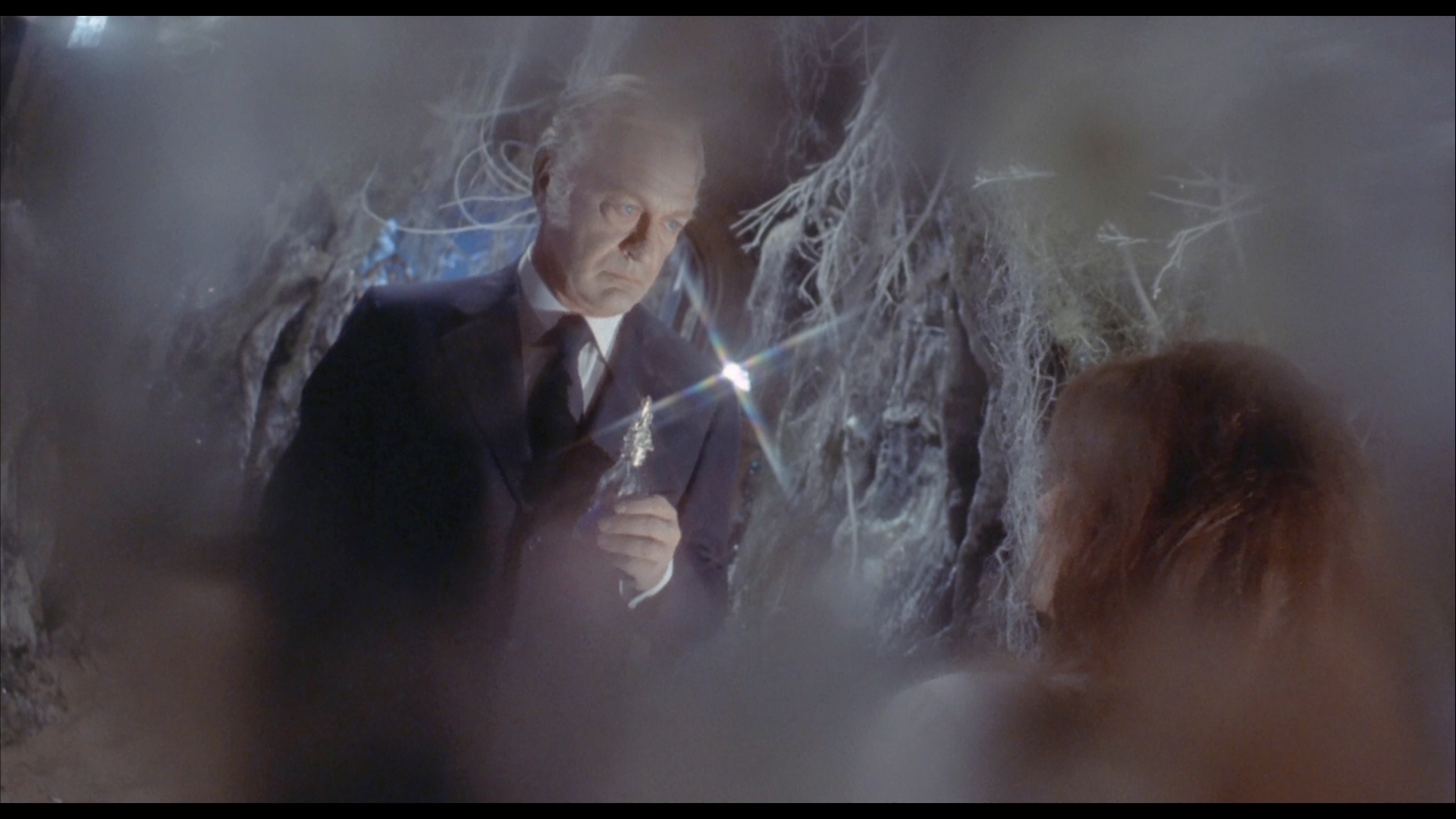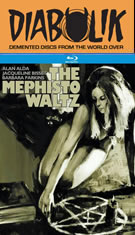
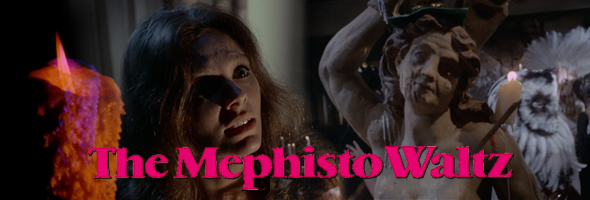
Color, 1971, 108 mins. 43 secs.
Directed by Paul Wendkos
Starring Alan Alda, Jacqueline Bisset, Barbara Parkins, Curd Jurgens, Bradford Dillman, William Windom, Pamelyn Ferdin
Kino Lorber (Blu-ray) (US RA HD), Signal One (Blu-ray & DVD) (UK RB/R2 HD/PAL), Fox (DVD) (US R1 NTSC) / WS (1.85:1) (16:9)
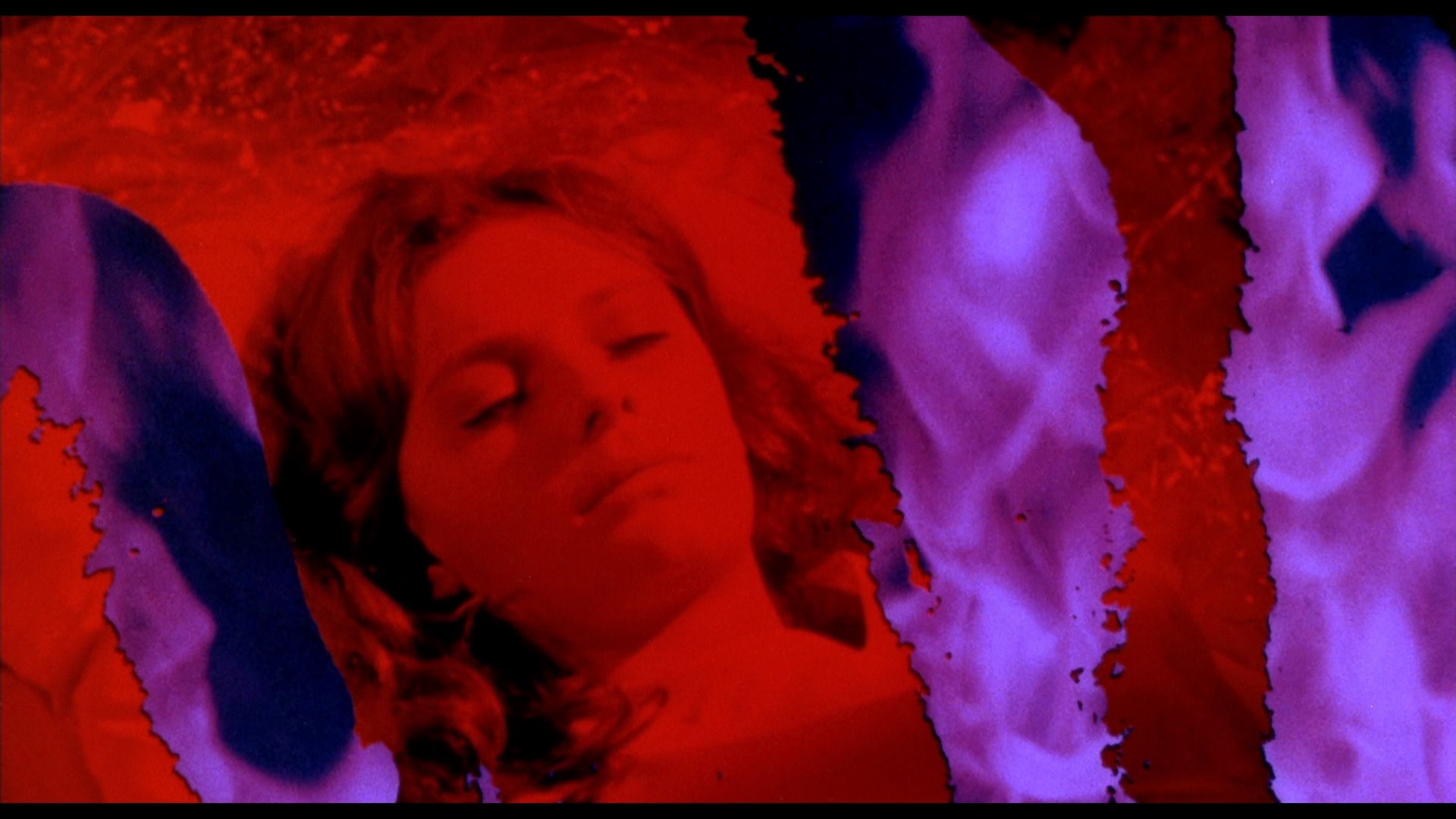
 Everyone was scrambling to find the next Rosemary's Baby in the early '70s, with upscale horror paperback properties getting snatched up left and right. Those efforts didn't really pay off until 1973 with The Exorcist, but one of the more interesting additions in the interim is The Mephisto Waltz, an adaptation of an odd classic music-themed occult novel by the late Fred Mustard Stewart. Originally set in New York, the story was transplanted to Southern California by production company Quinn Martin Productions (a name familiar to any avid '60s or '70s TV viewers) and TV director Paul Wendkos. As you might expect, the film has a strong '70s made-for-TV horror vibe, which isn't a bad thing at all and could account for why it exudes more of an eerie fascination now than when it initially opened to middling reviews and a muted box office reception.
Everyone was scrambling to find the next Rosemary's Baby in the early '70s, with upscale horror paperback properties getting snatched up left and right. Those efforts didn't really pay off until 1973 with The Exorcist, but one of the more interesting additions in the interim is The Mephisto Waltz, an adaptation of an odd classic music-themed occult novel by the late Fred Mustard Stewart. Originally set in New York, the story was transplanted to Southern California by production company Quinn Martin Productions (a name familiar to any avid '60s or '70s TV viewers) and TV director Paul Wendkos. As you might expect, the film has a strong '70s made-for-TV horror vibe, which isn't a bad thing at all and could account for why it exudes more of an eerie fascination now than when it initially opened to middling reviews and a muted box office reception. 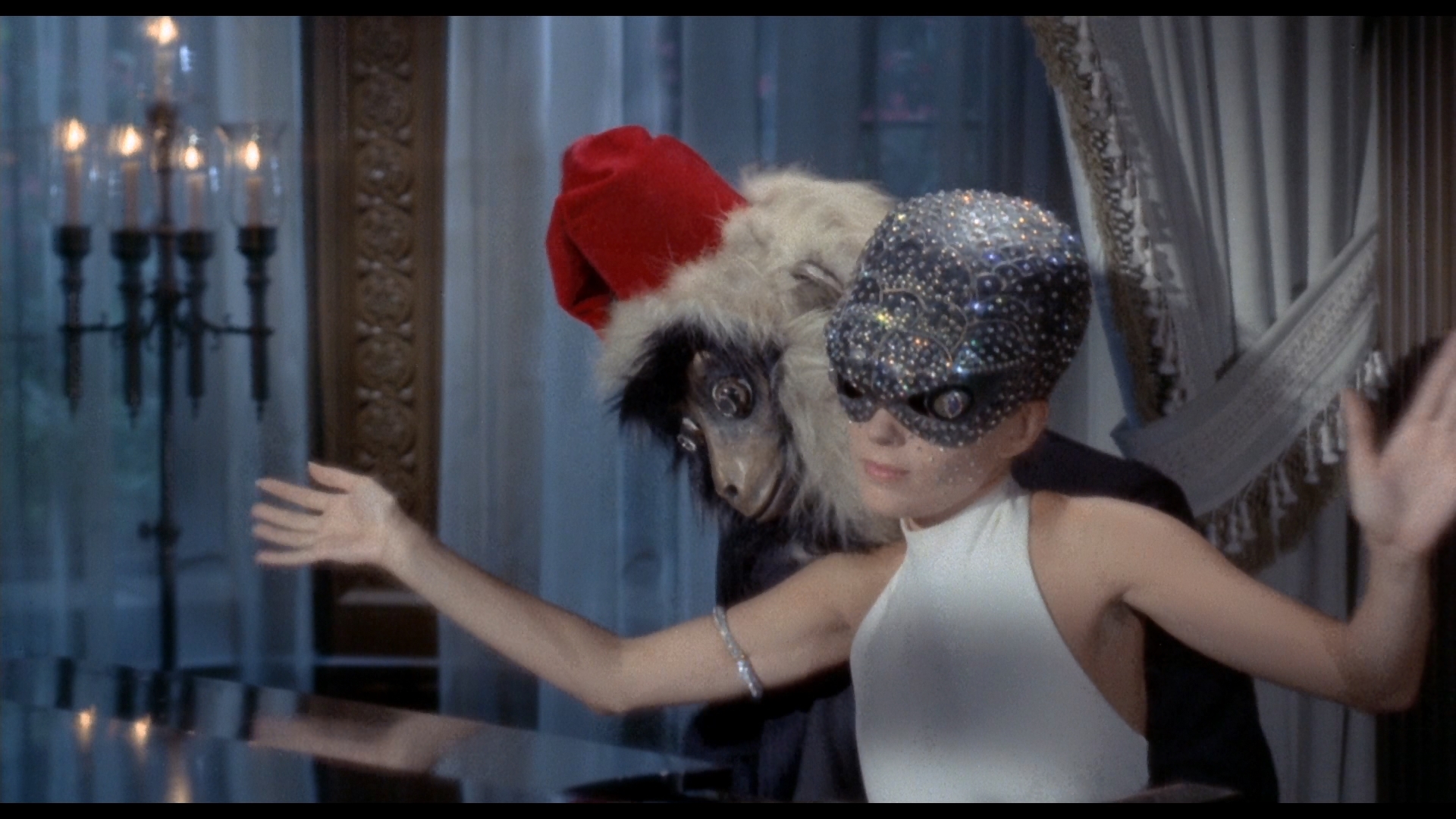 married to the beautiful Paula (Bisset) and blessed with a perky daughter (The Toolbox Murders' Ferdin), music journalist Myles
married to the beautiful Paula (Bisset) and blessed with a perky daughter (The Toolbox Murders' Ferdin), music journalist Myles  Clarkson (Alda) is summoned for an interview with legendary, eccentric pianist Duncan Ely (future 007 villain Jurgens) at the home he shares with his alluring and sinister daughter, Roxanne (Asylum's Parkins), who seems way too close to him for comfort. Ely is smitten with Myles's perfectly proportioned hands, which were once destined for a professional classical career until his big debut was torn apart by critics. The hapless couple is soon drawn into Ely's world via a decadent dinner party (complete with the film's most indelible image, a dog adorned with a human mask sauntered among the party goers). It soon becomes apparent that Ely and company are no strangers to satanism, something comes into play when he suddenly dies -- and Myles starts to behave very strangely and switches gear to becoming a very talented concert pianist. Convinced her husband has been taken over by Duncan's soul, Paula is haunted by a horrific nightmare involving face masks and ritual sacrifice that portends a terrible personal tragedy that will soon strike the couple and portend a string of dark deeds involving the two twisted families.
Clarkson (Alda) is summoned for an interview with legendary, eccentric pianist Duncan Ely (future 007 villain Jurgens) at the home he shares with his alluring and sinister daughter, Roxanne (Asylum's Parkins), who seems way too close to him for comfort. Ely is smitten with Myles's perfectly proportioned hands, which were once destined for a professional classical career until his big debut was torn apart by critics. The hapless couple is soon drawn into Ely's world via a decadent dinner party (complete with the film's most indelible image, a dog adorned with a human mask sauntered among the party goers). It soon becomes apparent that Ely and company are no strangers to satanism, something comes into play when he suddenly dies -- and Myles starts to behave very strangely and switches gear to becoming a very talented concert pianist. Convinced her husband has been taken over by Duncan's soul, Paula is haunted by a horrific nightmare involving face masks and ritual sacrifice that portends a terrible personal tragedy that will soon strike the couple and portend a string of dark deeds involving the two twisted families.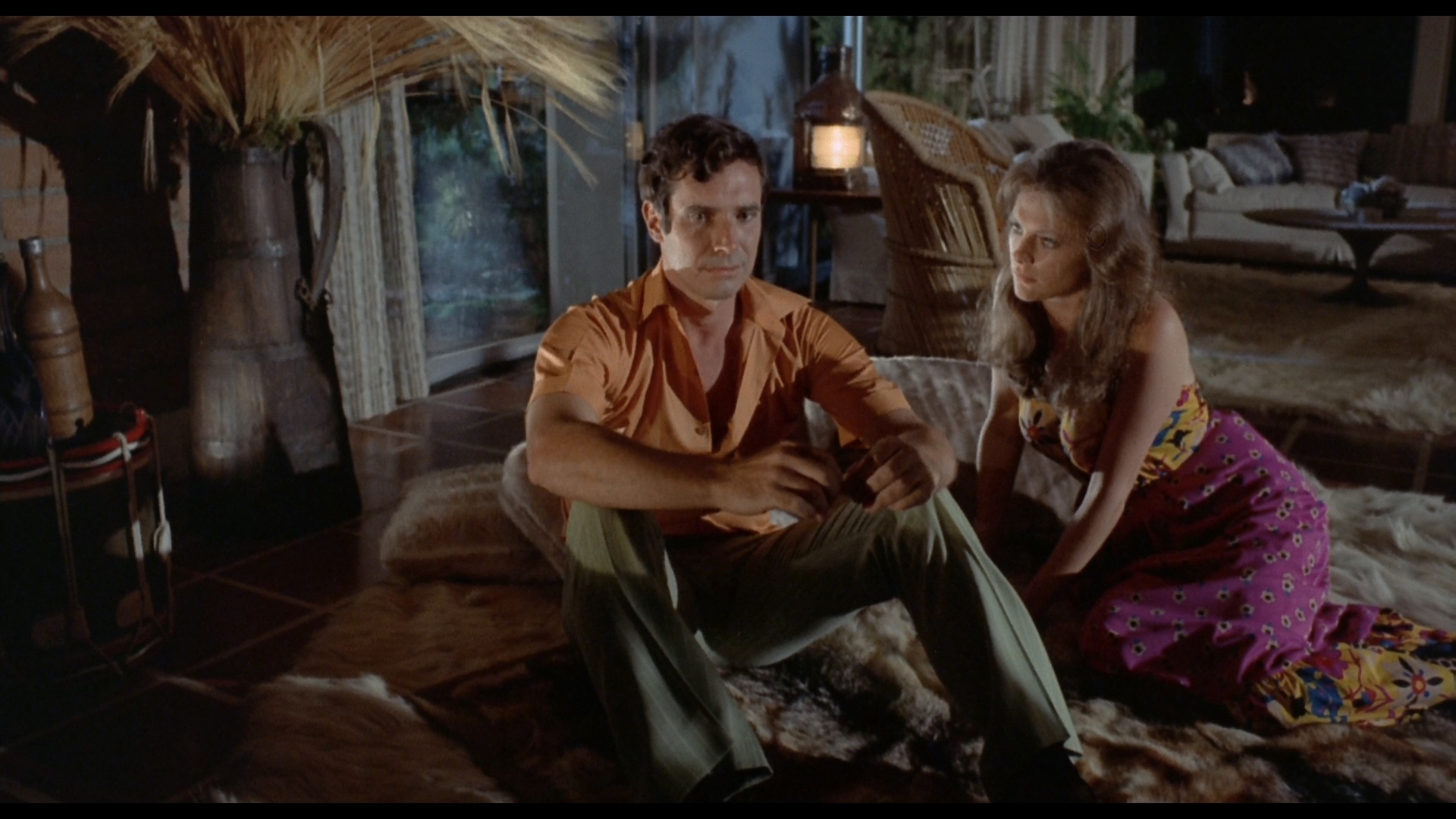 cases strangely cast (it takes a stretch to buy Alda as a demonically empowered sexual dynamo), The Mephisto Waltz is a strangely beguiling film thanks to its woozy post-Manson atmosphere, a churning monster of a music score by the great Jerry Goldsmith (frequently integrating elements of the titular Franz
cases strangely cast (it takes a stretch to buy Alda as a demonically empowered sexual dynamo), The Mephisto Waltz is a strangely beguiling film thanks to its woozy post-Manson atmosphere, a churning monster of a music score by the great Jerry Goldsmith (frequently integrating elements of the titular Franz 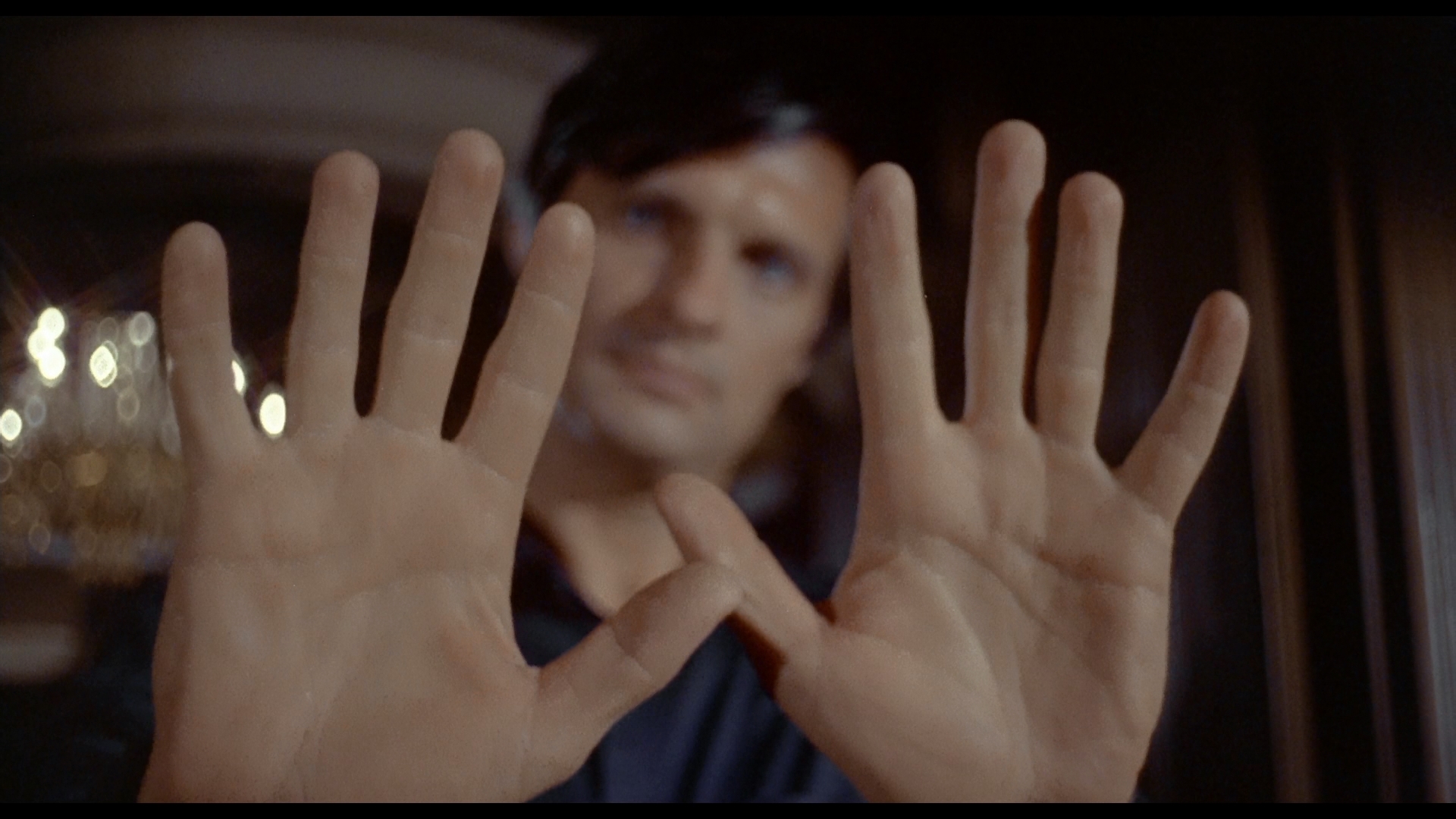 Liszt work and the familiar Dies Irae death chant), and a ruthless willingness to bump off any character at any time regardless of importance. You almost need a scorecard by the end to keep track of what's going on, but the evocation of satanic '70s pop culture is often very potent (including a memorable nude satanic invocation in French near the end) and about as close to the mood of Kenneth Anger as a studio film would dare to get at the time. The female cast members definitely fare best with Bisset looking stunningly beautiful and, apart from a clumsily conceived hospital sequence after one nasty plot twist, acquits herself very well as a horror heroine who takes some quite unexpected turns throughout he story. Never a big star despite Fox's efforts, Parkins is also quite effective in her more minor role, delivering an air of smoldering evil and sensuality that hints at past lifetimes filled with unspeakable misdeeds.
Liszt work and the familiar Dies Irae death chant), and a ruthless willingness to bump off any character at any time regardless of importance. You almost need a scorecard by the end to keep track of what's going on, but the evocation of satanic '70s pop culture is often very potent (including a memorable nude satanic invocation in French near the end) and about as close to the mood of Kenneth Anger as a studio film would dare to get at the time. The female cast members definitely fare best with Bisset looking stunningly beautiful and, apart from a clumsily conceived hospital sequence after one nasty plot twist, acquits herself very well as a horror heroine who takes some quite unexpected turns throughout he story. Never a big star despite Fox's efforts, Parkins is also quite effective in her more minor role, delivering an air of smoldering evil and sensuality that hints at past lifetimes filled with unspeakable misdeeds.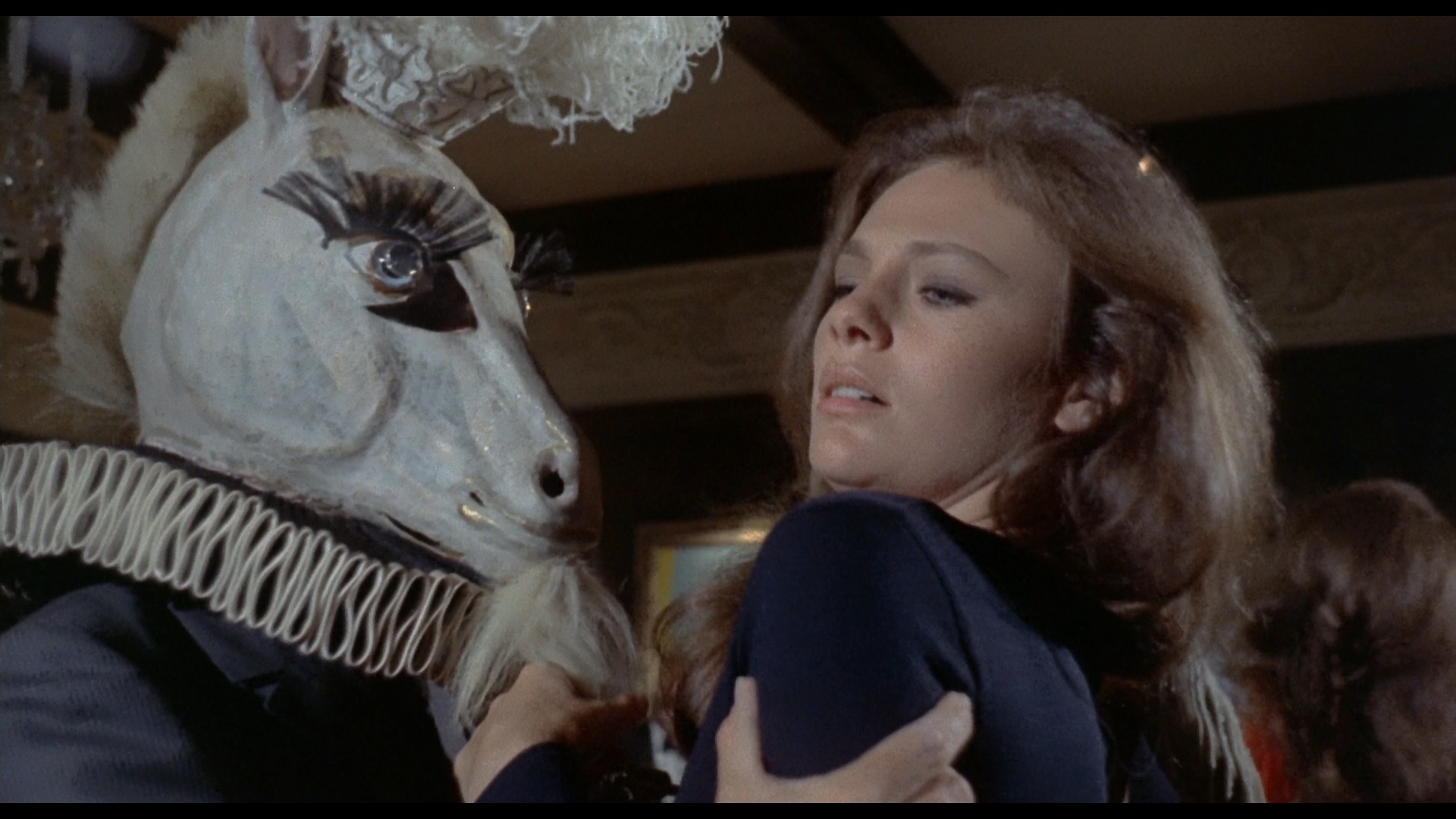 Oddly suppressed from public viewing for well over a decade after its 1975 TV premiere, The Mephisto Waltz turned up on VHS from Fox in 1989 and then made its first appearance on DVD in 2006 as part of the label's co-opted Midnite Movies line paired up with The House on Skull Mountain for some inexplicable reason. In 2017 the film first appeared on Blu-ray in the UK from Signal One, featuring a fresh HD transfer provided by Fox and a very strong LPCM English mono track (with
Oddly suppressed from public viewing for well over a decade after its 1975 TV premiere, The Mephisto Waltz turned up on VHS from Fox in 1989 and then made its first appearance on DVD in 2006 as part of the label's co-opted Midnite Movies line paired up with The House on Skull Mountain for some inexplicable reason. In 2017 the film first appeared on Blu-ray in the UK from Signal One, featuring a fresh HD transfer provided by Fox and a very strong LPCM English mono track (with 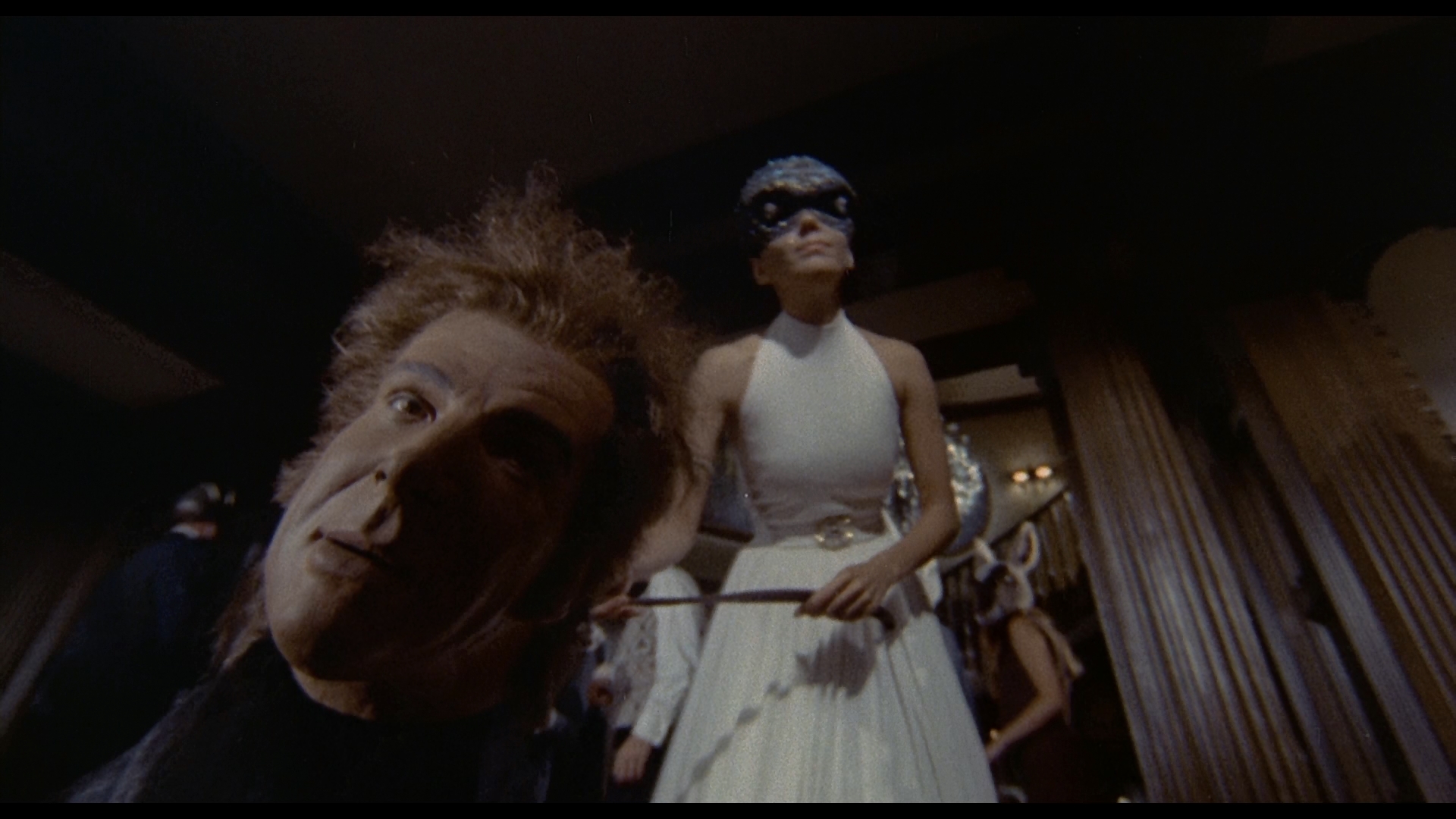 optional English SDH subtitles). (A DVD edition is also available.) The frequently garish colors look great here, especially those vivid blues, reds, and oranges during the faux Maurice Binder opening credits. An audio commentary with yours truly and Tim S. Greer is included so that obviously can't be assessed here, but hopefully it will add to your enjoyment of the film. The always well-spoken Michael Mackenzie appears for an 18 min. 52 sec. visual essay about his fondness for the film since exposure to it on TV at a young age, the unorthodox configurations of the male and female characters, the wave of occult movies during the early '70s, and plenty more. Also included are a gallery of promotional posters and stills and the original theatrical trailer.
optional English SDH subtitles). (A DVD edition is also available.) The frequently garish colors look great here, especially those vivid blues, reds, and oranges during the faux Maurice Binder opening credits. An audio commentary with yours truly and Tim S. Greer is included so that obviously can't be assessed here, but hopefully it will add to your enjoyment of the film. The always well-spoken Michael Mackenzie appears for an 18 min. 52 sec. visual essay about his fondness for the film since exposure to it on TV at a young age, the unorthodox configurations of the male and female characters, the wave of occult movies during the early '70s, and plenty more. Also included are a gallery of promotional posters and stills and the original theatrical trailer. 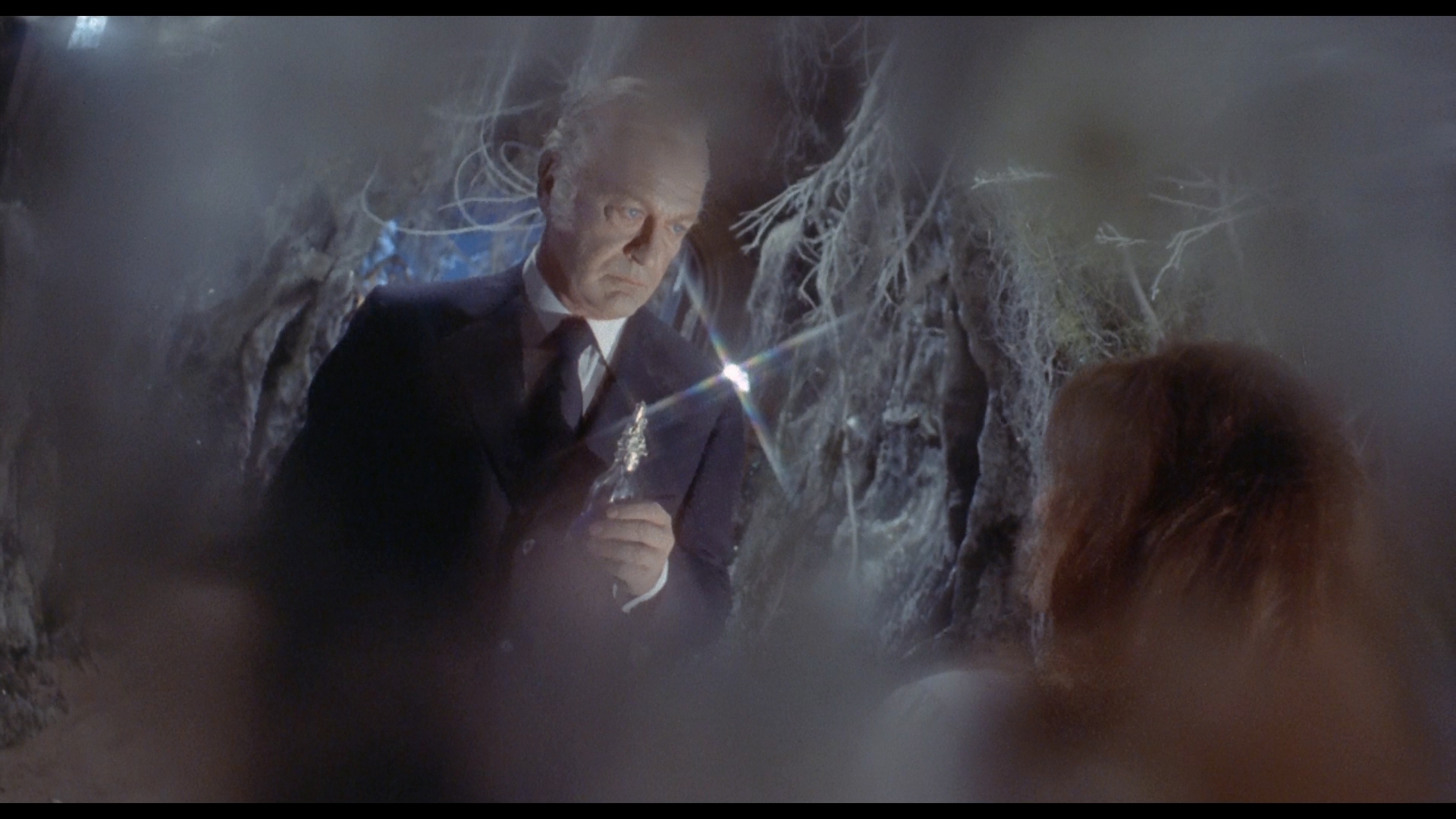 brightens up a few notches (see frame grabs below for comparison) and features some notable variations in the way film grain and clothing textures appear in motion throughout. Apart from the trailer, the extras are entirely different here with a pair of audio commentaries starting off with a scholarly rundown by Video Watchdog writer Bill Cooke. He goes in depth on the motifs of the score, the background of the source novel, and the financial and organizational pitfalls of
brightens up a few notches (see frame grabs below for comparison) and features some notable variations in the way film grain and clothing textures appear in motion throughout. Apart from the trailer, the extras are entirely different here with a pair of audio commentaries starting off with a scholarly rundown by Video Watchdog writer Bill Cooke. He goes in depth on the motifs of the score, the background of the source novel, and the financial and organizational pitfalls of 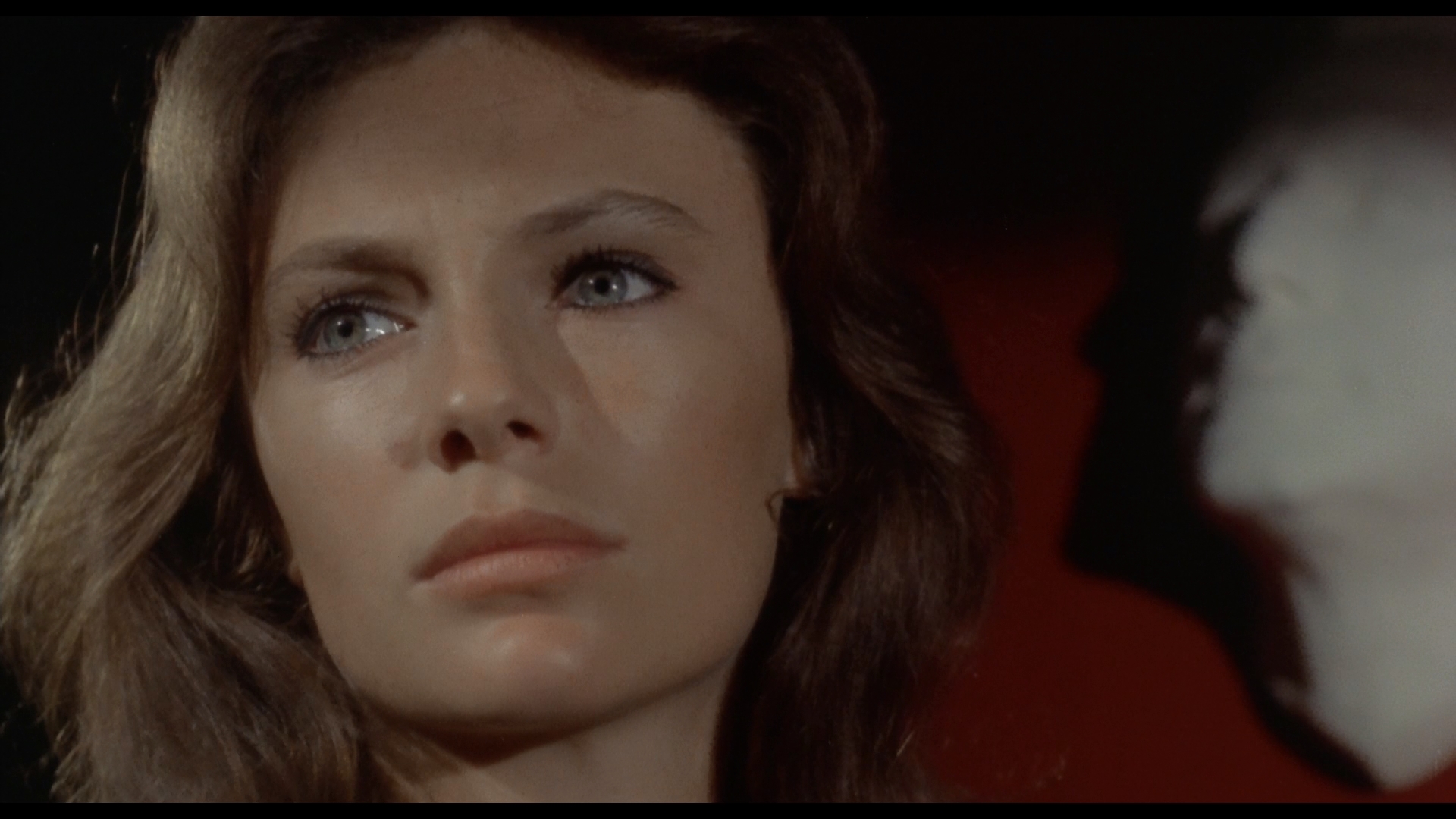 Fox at the time among many other topics, offering a fine sketch of how the film came to be and played an odd role in the evolution of occult Hollywood cinema. Ferdyn appears next for a very lively commentary moderated by Elijah Drenner in which she recalls plenty about being a child actor at the time, doing Quinn Martin Productions, sensing generational tension between Martin and Wendkos, being a comfort to Alda while he was far away from his family in New Jersey, being blocked from the set during certain scenes, and plenty more. Her limited role in the film means there's also plenty of room for other subjects as well including a detour involving her role in The Beguiled. It's also nice to say that her distinctive voice still sounds very much the same, and she's just as charming here as you'd expect. Also included are bonus trailers for Burnt Offerings, Deranged, and Jennifer.
Fox at the time among many other topics, offering a fine sketch of how the film came to be and played an odd role in the evolution of occult Hollywood cinema. Ferdyn appears next for a very lively commentary moderated by Elijah Drenner in which she recalls plenty about being a child actor at the time, doing Quinn Martin Productions, sensing generational tension between Martin and Wendkos, being a comfort to Alda while he was far away from his family in New Jersey, being blocked from the set during certain scenes, and plenty more. Her limited role in the film means there's also plenty of room for other subjects as well including a detour involving her role in The Beguiled. It's also nice to say that her distinctive voice still sounds very much the same, and she's just as charming here as you'd expect. Also included are bonus trailers for Burnt Offerings, Deranged, and Jennifer. 
